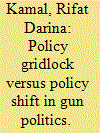| Srl | Item |
| 1 |
ID:
184760


|
|
|
|
|
| Summary/Abstract |
In this article, I offer a theory of lawmaking in multiparty presidential systems with different legislative institutions. I present a model that combines Krehbiel's pivotal politics theory with Tsebelis's veto players theory. This model simplifies various institutional veto players into the de facto veto players. I analyze the model to explain how the government type (unified versus divided governments), the legislative rules (majoritarian versus supermajoritarian rules), and the party system (two-party versus multiparty systems) affect legislative productivity. I apply the theoretical results obtained to solve the puzzle about the nondifferential legislative performance between unified and divided governments in the National Assembly. I test a hypothesis stating that the distance between the ideological positions of the agenda-setter and the de facto veto players has a negative effect on the proportion of controversial bills enacted between the 16th and the early 21st National Assemblies.
|
|
|
|
|
|
|
|
|
|
|
|
|
|
|
|
| 2 |
ID:
163913


|
|
|
|
|
| Summary/Abstract |
Why do major events of gun violence (i.e., mass shootings) lead to incremental change or no federal legislative change at all in the United States while major events of gun violence have resulted in large-scale legislative changes in Canada? Exploring the complexities involved in this compelling question, this article conducts a comparative analysis of recent gun control policy gridlock and shift in these two countries. We concentrate on two mass shooting cases in each country: the Columbine (1990) and Sandy Hook (2012) massacres in the United States and the École Polytechnique Massacre (1989) and Concordia Shooting (1992) in Canada. We use veto player theory to gain insights into why tightening gun policy is so difficult to implement in the United States while Canada often follows up with policy transformations after a focusing event. This theory informs the central argument that the key factors underpinning the divergent policy outcomes on gun control issues in both countries involve differences in the structure of government/institutional design and the role and power of interest groups in each case.
|
|
|
|
|
|
|
|
|
|
|
|
|
|
|
|
| 3 |
ID:
108355


|
|
|
|
|
| Publication |
2011.
|
| Summary/Abstract |
Why did the unified government led by Taiwan's president Ma Ying-jeou experience gridlock? In this article, I answer this question by modifying the veto player theory to explain how policies are made in Taiwan's semipresidential system, in which the president can unilaterally appoint a premier who is accountable to the national legislature. Given this constitutional design, the premier represents the president rather than the legislature, so the agenda setter is either the legislature or the president. A veto player model shows that the legislature, as a collective veto player, has the last-mover's advantage when it sets the agenda and that the two executive heads are more likely to be in congruent if a policy has to be deliberated by the legislature. The president sets the agenda only if he can discipline the legislators in his party and the legislature is not allowed to amend an executive proposal. This theory explan is why policies involving lawmaking give Taiwan's Legislative Yuan considerable bargaining powers, even to the disadvantage of the president. These theoretical arguments are confirmed by hypothesis-based case studies and can be generalized to study other semipresidential regimes.
|
|
|
|
|
|
|
|
|
|
|
|
|
|
|
|